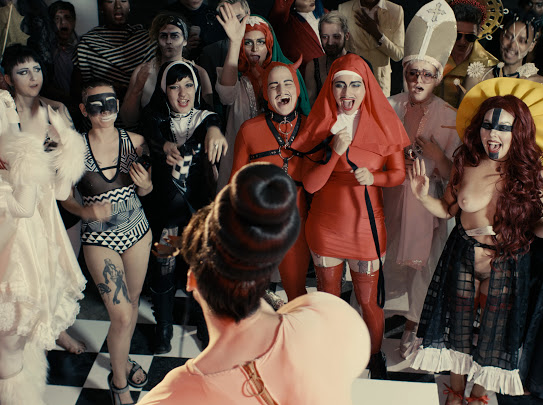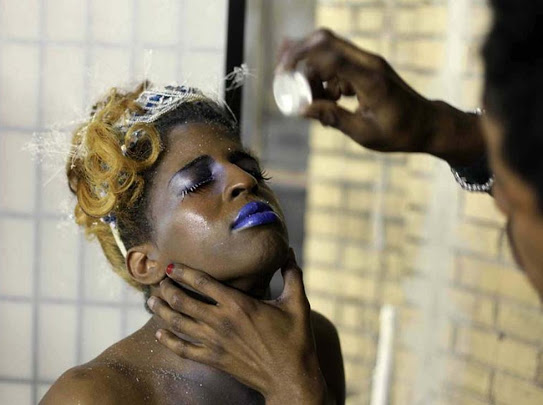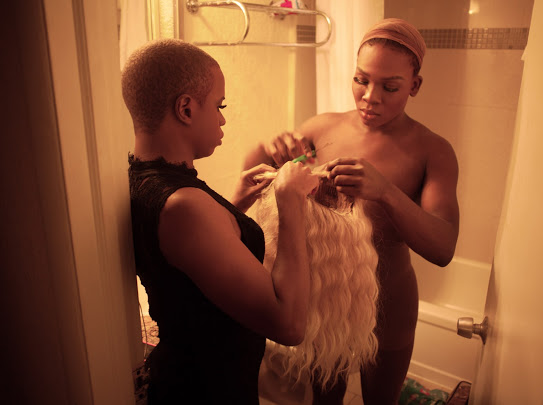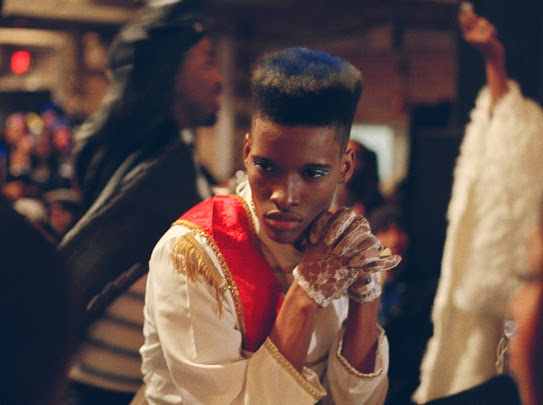In recent years mainstream cinema has made queer stories and characters more visible but the current generation of independent queer filmmakers has refreshed the culture by opening up spaces to voices that previously had been discouraged, ignored and even ostracized. Two highly recommended films being featured in the Utah Film Center’s 17th annual Damn These Heels Queer Film Festival widen the path blazed and cleared by queer and Transcestor artists and creative producers: the fabulously campy and astute Holy Trinity, written and directed by Molly Hewitt, and the incisively relevant documentary Pier Kids, directed by Elegance Bratton. Both films are impressive feature-length debuts for their respective directors.
Holy Trinity will only be available for virtual streaming for passholders and individual ticket buyers on July 18 while Pier Kids is available through July 19.

Holy Trinity
Despite the many skeptics about her skills to communicate with the dead, Theresa Caputo, also known as the Long Island Medium, has overcome the cynics as a funny entertainer in her touring show The Experience. As one reporter describes it, “she’s polished like an old crystal ball.” Caputo says that her performance, which she emphasizes is not about believing if one can communicate with the dead, “It’s about witnessing something life-changing. It’s witnessing first-hand spirit communication.”
Molly Hewitt riffs smartly on the success of entertaining ‘mediums’ such as Caputo in their feature-length debut Holy Trinity, a deliciously shameless romp celebrating sex positivity at all points of the rainbow spectrum. Hewitt orchestrates their project with immensely satisfying impact, visually as well as in cast performances. Many of the cast members have no previous screen acting experience but their work on queer and drag stages brings the appropriately sincere, fresh vibe to absurd comedy that delivers worthwhile cultural insights.

Filmed in Chicago’s south side, where Hewitt and their performance colleagues are based, Holy Trinity plays fearlessly in intense hues of orange and pink with wild, loud scenes set in spaces that could be the conventional well-ordered manifestations of perfect geometric and angular forms. The film also becomes a really sharp critique of mega-corporate brands that eschew diversity in consumer product choices. In Holy Trinity, viewers are introduced to the fictional mega-corporation Glambrand, which produces an intoxicating room deodorizing spray (Orishako).
All of Glambrand’s products carry the Glam Hag name (which incidentally happens to be Hewitt’s performance alter ego). Trinity, a dominatrix, (played by Hewitt) huffs the spray and discover they can now summon the voices of the dead. This new power though interferes with Trinity’s dominatrix work and their clients – a premise that leads to delightfully absurd comic episodes in the film.
But, there also is an epiphany embedded in this hilarious premise. Trinity is so occupied by hearing the voices of the dead they ignore their own sensibilities from listening to their most important voices in their life – notably, their lover Baby. Thus, the theme of the dangers of seeing one’s true identity being coopted by the temptations of naked commercialism, fame and the conviction that one’s spirituality is superior to others is cogently explored in Hewitt’s film. More plainly, do not let external forces interfere with your truest identity. And, sex positivity should not be constricted as a confusing juxtaposition in one’s personal journey for discovering the best path to their spiritual well-being.
The film evokes a collaborative DIY vibe, which really gels with Hewitt’s creative intentions. And, with a cast that Hewitt sincerely allows them to be whom they represent in their off-screen lives, Holy Trinity comes off as a really smart piece of entertainment, especially in the boffo party scene that takes place in the middle of the film.
Pier Kids
In New York City, for queer youth who have been kicked out of their homes for being who they really are, the Christopher Street Pier in Manhattan’s West Village, near the birthplace of the Stonewall uprising and the biggest wave of the gay rights movement, has become their safe space. Elegance Bratton’s documentary is exceptional in every regard.
While most of the documentary comprises footage shot in 2011 and 2012, Bratton also includes scenes filmed in 2016 to update some of the stories. Viewing the film, which was completed in 2019 and has played to well-earned praise at major festivals, the oppressive struggles to stay alive much less survive in the hopes of finding food and a place to stay that Bratton shows appear even more relevant today.

Three stories anchor the documentary, coming from Krystal, DeSean and Casper. Many of the youth who discover the Christopher Street pier are well aware of the historical significance. Krystal, a Black trans woman, channels Crystal LaBeija, who Damn These Heels viewers saw last week in the screening of The Queen, the 1968 documentary directed by Frank Simon.
The pier kids are hard-nosed pragmatists in their quest to stay safe and survive. The pier becomes, for the lack of a better comparison, their living room. They are like family to each other. Many of them are natural performers. DeSean talks compellingly about the economic realities and difficulties of finding a stable place to stay. He describes how he can shoplift food and personal care products without getting caught.

They are not naïve about the hypocrisies of capitalism. As difficult it is to find a job that pays enough so one can afford to live in New York City, DeSean and his friends know that those who come looking for a sex worker in the area will begrudgingly pay enough if they are desperate enough to have sex.
Even for those lucky enough to stay at a friend’s house, many of them always return to the piers to check on their friends—in the hopes that they have not died because of an overdose or were killed. In 2012, one of the pier community’s most beloved members, the skateboarding Casper (Jusheem Thorne) was killed by two hit-and-run drivers in the Crown Heights district. The first car left him injured in the street and then he was killed by the driver of a second car who also refused to stop. The film shows an entire pier community in a memorial service.
Drugs and addiction also are common and chem sex is an outlet that many seek out to ease their inner pain and depression, which, in turn, makes them vulnerable to HIV infection. No question, the biggest dangers the pier kids face come with the New York City police. The youth face relentless harassment and the police try to scare people away from the area, which has many of the city’s most widely patronized gay bars. Blatant profiling is widely used because police assume the youth do not know enough about their own rights or legal options. But, many of them, such as Krystal, are wise, knowing that they were victimized by entrapment and can make the case for having the charges dropped.
Krystal’s determination is steel. Her mother kicked her out of the house when Krystal came out, which led her to discover the pier kids community. In the film Krystal returns home to visit her mother and aunt, both of whom have not changed their transphobic midns. They are disappointed that Krystal does not leave her lifestyle outside the mother’s home. The mother insists that Krystal always will be her son. Fortunately, Krystal’s story turns out to be one of the most optimistic outcomes seen in the film.

Pier Kids is an excellent introduction to Bratton’s work. At Sundance this year, he premiered Buck, a live-action short that he wrote and directed and co-produced with Jovan James. The film examines the impact of a chem sex culture through the lens of Lynn, a young gay Black man. The title references the older white character (Buck) who preys on young men for the purpose of indulging a dangerous voyeuristic fetish. He enjoys watching his victims overdose. Buck echoes the same vulnerabilities queer youth of color face in Pier Kids—HIV infection, drug addiction, thoughts of suicide, self-medication to ease the pain of depression.
Like the subjects of Pier Kids, Bratton was kicked out of his family’s home for being gay. He was homeless for a decade before joining the Marines. He had learned about filmmaking from books he stole. His forthcoming cinematic project is based loosely on his own experiences. Inspection, set in the last days of Don’t Ask, Don’t Tell , is about a young homeless gay man who conceals his orientation and joins the Marine to establish his livelihood
